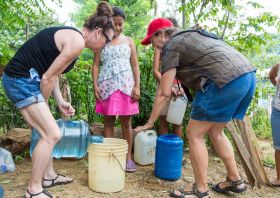How are women and girls treated in Nicaragua?
Marissa Gabrielle Lolk - Jireh Dental Care
 How women and girls are treated in Nicaragua is a very controversial question. I just recently had a conversation about this at my daughter’s school. Foreign women have noticed that women here in Nicaragua tend to be a little bit more submissive to their male counterparts. They are used to having a man dominate the finances. Most girls go to college and then become stay-at-home moms, which is extremely weird. It’s almost like they essentially go to college to get married...
How women and girls are treated in Nicaragua is a very controversial question. I just recently had a conversation about this at my daughter’s school. Foreign women have noticed that women here in Nicaragua tend to be a little bit more submissive to their male counterparts. They are used to having a man dominate the finances. Most girls go to college and then become stay-at-home moms, which is extremely weird. It’s almost like they essentially go to college to get married... How women and girls are treated in Nicaragua is a very controversial question. I just recently had a conversation about this at my daughter’s school. Foreign women have noticed that women here in Nicaragua tend to be a little bit more submissive to their male counterparts. They are used to having a man dominate the finances. Most girls go to college and then become stay-at-home moms, which is extremely weird. It’s almost like they essentially go to college to get married and they are proud of being stay-at-home moms.
How women and girls are treated in Nicaragua is a very controversial question. I just recently had a conversation about this at my daughter’s school. Foreign women have noticed that women here in Nicaragua tend to be a little bit more submissive to their male counterparts. They are used to having a man dominate the finances. Most girls go to college and then become stay-at-home moms, which is extremely weird. It’s almost like they essentially go to college to get married and they are proud of being stay-at-home moms. Being a woman here in Nicaragua is like being in the US in the 1950s. Nicaraguan women are amazing hostesses. They throw these really nice parties and they are very social. They have get-togethers a lot. Nicaraguan men usually have their wives cater to the guests. As a foreign woman here in Nicaragua, it feels like being in a time warp. In a weird way, I really like it! But then something inside of me realizes that I don’t know if I’m completely in agreement with how things work here.
I think that I’m a different type of person. For example, I think that girls should be equal to boys, which is something we just talked about at the school. We just had an open house at the school when a European mom brought it up. She asked, “How are you implementing gender equality into the curriculum?” The teachers didn’t know how to take the question and address it properly. It was a disaster.
You can see that from the last several years that women are slowly shifting into gender equality and the equality of roles. More women are starting to realize that they don’t have to stay at home and they could be working moms. They are realizing that they don’t have to be home and do everything by themselves such as cooking and cleaning. They are starting to slowly wake up and say, “No, we should be partners in the home.” This shouldn’t be controversial but it so deeply ingrained in the culture of the country of Nicaragua that a transition is going to take a very long time.
As an expat woman, I do not feel uncomfortable at all being in Nicaragua. However, I do not feel like I could not have married a Nicaraguan just because I don’t like their philosophy of life. Their spousal relationships are a little bit complicated but it is not like in the Middle East where you are not allowed to do things as a woman and being a woman is somewhat like a curse. It is not like that in Nicaragua but it is like being in the 1950s. Women here in Nicaragua are “Beverly Cleaver.” It’s like an episode from the Stepford Wives. They all dress the same and they kind of act the same.
If you go to Nicaragua, you will find that women do not really have an individual style. They are all preppy and they all look like they live on Wisteria Lane from the Desperate Housewives.
(The American and Spanish version of the poster for Desperate Housewives, pictured.)
Posted October 10, 2016
Barry Oliver - Surfing Nahua
 My daughter is a very independent girl, and that keeps me a little more at ease. Women in the past have been mistreated in Nicaragua. History-wise, there’s machismo like anywhere else in Latin America, which definitely worries me and sits on my mind, but I think my daughter is in the right places and is doing the right things.
My daughter is a very independent girl, and that keeps me a little more at ease. Women in the past have been mistreated in Nicaragua. History-wise, there’s machismo like anywhere else in Latin America, which definitely worries me and sits on my mind, but I think my daughter is in the right places and is doing the right things. Nicaragua’s police chief and vice president are both female. There is a lot of female influence in...
 My daughter is a very independent girl, and that keeps me a little more at ease. Women in the past have been mistreated in Nicaragua. History-wise, there’s machismo like anywhere else in Latin America, which definitely worries me and sits on my mind, but I think my daughter is in the right places and is doing the right things.
My daughter is a very independent girl, and that keeps me a little more at ease. Women in the past have been mistreated in Nicaragua. History-wise, there’s machismo like anywhere else in Latin America, which definitely worries me and sits on my mind, but I think my daughter is in the right places and is doing the right things. Nicaragua’s police chief and vice president are both female. There is a lot of female influence in Nicaragua’s leadership. I see a lot of female police officers in Nicaragua, which indicates that times are changing. It’s definitely something to be concerned about, but the good news is it’s moving in the right direction.
(Barry Oliver with his family on the beach in Nicaragua, pictured.)
Posted April 8, 2017
Carlos Roman Gutierrez Solis - Casa Granada Properties
 The treatment of women and girls in Nicaragua will depend on where you live, where you grew up, and your level of education. In the city, women are now more independent.
The treatment of women and girls in Nicaragua will depend on where you live, where you grew up, and your level of education. In the city, women are now more independent. People with basic education will probably be rude and wild. Nicaragua may have some problems with men who take advantage of girls, but this depends on where you are in Nicaragua.
A woman who is from a middle and upper class family would be...
 The treatment of women and girls in Nicaragua will depend on where you live, where you grew up, and your level of education. In the city, women are now more independent.
The treatment of women and girls in Nicaragua will depend on where you live, where you grew up, and your level of education. In the city, women are now more independent. People with basic education will probably be rude and wild. Nicaragua may have some problems with men who take advantage of girls, but this depends on where you are in Nicaragua.
A woman who is from a middle and upper class family would be independent, a go getter, well educated, and go to good schools. However, women from the countryside would not have the same opportunities and may be treated badly sometimes.
My daughter who is nine years old is treated properly in the city. She will be able to do what she wants to do. Parents play an important role in teaching kids how to become independent.
The best jobs with the best incomes in Nicaragua are still held by men, which is the same way everywhere else in the world. Women who want to break into this culture need to be more aggressive because they need to prove that they can do it, too. The new generation of Nicaraguans understands this little by little.
Nicaragua has a population of six million and only 20% to 30% have access to good education. Nicaragua is moving forward in the direction of improving the level of education of its citizens.
(Acknowledgement to all the female employees of Casa Granada Properties on International Women's Day, Granada, Nicaragua, pictured.)
Posted August 7, 2017
Elisha MacKay
 Nicaragua has a very machismo culture about it towards women. It's not uncommon if I'm alone, either driving in my truck or walking somewhere on the street, for a young local male to whistle; to tell me they love me; to say, "Hey, baby!"; or blow kisses at me. That's not uncommon at all.
Nicaragua has a very machismo culture about it towards women. It's not uncommon if I'm alone, either driving in my truck or walking somewhere on the street, for a young local male to whistle; to tell me they love me; to say, "Hey, baby!"; or blow kisses at me. That's not uncommon at all. The thing is they don't only do it to foreigners, but they also do it to local Nicaraguan women. It's not just because I'm a foreigner that I'm...
 Nicaragua has a very machismo culture about it towards women. It's not uncommon if I'm alone, either driving in my truck or walking somewhere on the street, for a young local male to whistle; to tell me they love me; to say, "Hey, baby!"; or blow kisses at me. That's not uncommon at all.
Nicaragua has a very machismo culture about it towards women. It's not uncommon if I'm alone, either driving in my truck or walking somewhere on the street, for a young local male to whistle; to tell me they love me; to say, "Hey, baby!"; or blow kisses at me. That's not uncommon at all. The thing is they don't only do it to foreigners, but they also do it to local Nicaraguan women. It's not just because I'm a foreigner that I'm treated that way. This is just the machismo culture.
For me, it happens rarely or on occasion. I just accept that this is the way it is. It doesn't make me feel good, but it also doesn't make me angry or upset. I have some female friends who are very bothered by the actions of local males here in Nicaragua though.
I don't feel threatened. The local males never make me feel unsafe. I don't feel like a local male would come and approach me. I think they're really too shy to do that. The males here will make eye contact with you and they won't break that eye contact if you don't. That makes me feel slightly uncomfortable, but not enough to really bother me or affect my day-to-day.
Doing business as a woman in Nicaragua, there have been times when Gordon, my husband, has been out of town and I needed to take our truck to the mechanic. I feel respected by Carlos, our mechanic, even though I'm a woman. He treats me with the utmost respect and speaks to me just the way he would if he were speaking to Gordon about a problem with the truck.
We work with another gentleman who provides transportation for all of our clients going back and forth to the airport and we have an amazing relationship with him. I know he totally respects me as a woman running a business.
(Elisha MacCay getting potable water to others in need after Hurricane Nate in Nicaragua, pictured. )
Posted October 17, 2017


